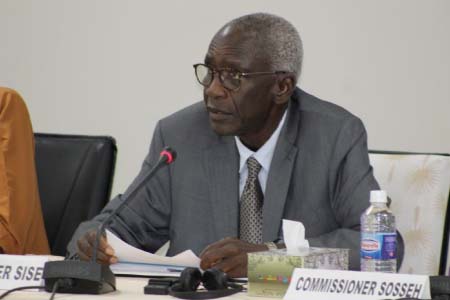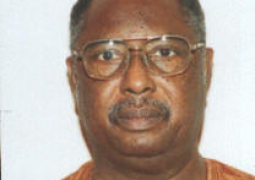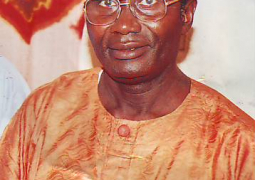
(Issued Monday 21 January 2020)
On Thursday, December 5, 2019, the TRRC concluded its 10th three-week session of public hearings. During that session, which focused on former president Jammeh’s witch hunts and saw the Commission’s first set of regional hearings conducted in the Greater Banjul Area, Jambur, Sibanor and Essau, 37 witnesses appeared before the Commission. The total number of witnesses appearing before the Commission since the commencement of the public hearings on January 7, 2019 is now 188. These include 51 women, 35 perpetrators, alleged perpetrators and adversely mentioned persons, and 23 Gambian Diaspora witnesses who testified via video link. In addition to the public hearings, one closed hearing and two protected witness hearings were held during 2019.
This
11th session of the public hearings, the first in 2020, begins today, January
20 and will end on Thursday, February 6.
The
Commission had initially planned to start this year’s hearings with testimonies
from victims of the former president’s alternative HIV/AIDS and other ailments
treatment programme. However, due to circumstances beyond our control, this was
not possible. The present session will therefore start with testimony from an
expert witness as envisaged under the relevant provisions of the TRRC Act and
the Commission’s Rules of Procedure. The expert will focus on the making of the
Jammeh dictatorship. The session will then continue with testimonies on the
violation of the rights of religious leaders – both Muslim and Christian – that
happened under the previous regime. During the course of the session, and
should the need arise, witnesses on other themes may be invited to testify
before the Commission.
As
we begin this 11th session of public hearings, we brace ourselves for yet
another series of revelations of human rights violations and abuses perpetrated
against the people of this country by the very government that was supposed to
protect their lives and liberties. Since hearings started in January 2019, the
Commission and indeed the Gambian people and all who have been following our
proceedings heard the most horrendous violations of human rights and
abuses.
From
the extrajudicial killings of the November 11, 1994 victims, to the murder of
Ousman Koro Ceesay, the murders of innocent people like Deyda Hydara, Haruna
Jammeh, Marcie Jammeh, the April 2000 student victims, and the sexual violence
meted out to several young women by none other than the custodians of the
State. The graphic confessions of the Junglers almost made it imperative to
wonder whether reason itself had gone mad in this country.
But
nothing prepared us for the revelations of the 2009 witch hunts sponsored by
the State. Anyone who watched and listened to the testimonies of the witch hunt
victims is not likely to forget anytime soon or to outgrow the feeling of
sadness that was generated by the senseless pain inflicted on those victims.
During that dark and tragic episode of our nation’s history, hundreds of
innocent men, women and even children were picked up at random by security
forces accompanied by quack witch doctors, subjected to all manner of
humiliating treatment, and forced to drink strange concoctions that instantly
caused them to momentarily lose their senses, At least 39 people died as a
result of taking the concoctions.
Up
to this day, hundreds continue to struggle with seemingly intractable health
conditions. And all this executed by our own security forces on the orders of
the highest authority in the land, whose sacred duty it was to serve and
protect the people.
It
is perhaps common knowledge that only a fraction of the victims of the witch
hunts gave statements to the TRRC or came forward to testify publicly. We
believe that a significant number of victims chose not to come forward to
testify. Many victims were dissuaded from giving statements or having family
members testify on their behalf for fear of stigmatization that comes from
being branded a witch in our culture and society. The abiding shame and pain
that comes with such branding can only be imagined and may never be fully
described even by the victims themselves simply because it defies description.
Victims who testified before the Commission during our last session spoke of
the extraordinary humiliation they suffered and continue to suffer since false
allegations of witchcraft were leveled against them by agents of the state, ten
years ago.
The
devastating impact of the 2009 witch hunts on the survivors and their families
calls for sober reflection by all Gambians. Indeed, considering the magnitude
of the shame and pain suffered by these victims and their families on a day to
day basis, we dare say that as a country we need to reform some of our cultural
attitudes. The work ahead of us, as a Commission and as a country will not be
easy. The path will be rocky and tear-filled and the challenges will be
daunting.
But
with determination and the use of reason, we can see the successful completion
of this important national project and collectively move our country towards
abiding peace, reconciliation, healing and well deserved justice for all
victims of human rights violations in this country. We are certain that
together as a nation, Gambians will successfully emerge from this painful
process a stronger and better people who will never again allow their human
rights and dignities to be violated with impunity.
The
TRRC continues to encourage all victims of human rights violations and abuses
to come forward and give statements to the Commission.
On
that note, the TRRC continues to crave the support and blessings of all members
of the public at home and abroad as we begin this 11th session of public
hearings.
Thank
you for your kind attention.



